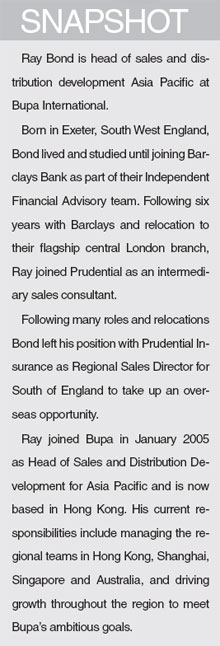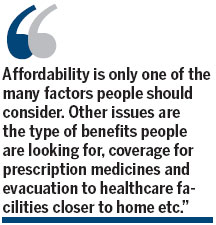Gearing up for the aging boom
Updated: 2013-11-22 07:20
By Wong Joon San(HK Edition)
|
|||||||||
Hong Kong's population is aging at lightning speed and as with aging populations everywhere, a primary concern is health care. Bupa, an international healthcare group, is moving into position as the dominant player in this market. Wong Joon San reports.
Bupa moved into position as Hong Kong's leading healthcare provider with an announcement on Oct 15 of its HK$335 million ($43.2 million) purchase of Quality HealthCare Medical Service (Quality HealthCare), from Fortis Healthcare in October.
"For Bupa, Hong Kong is a key market, and this acquisition shows it for me," says Ray Bond, who is in charge of Bupa's international medical insurance division in Asia Pacific. His focus is on sales and distribution. He sees the acquisition as a first step to addressing the needs of Hong Kong's rapidly aging populace.
Bupa began offering quality medical health care insurance in Hong Kong in 1976.
The target market for Bond and his team are people demanding top level care: high net worth individuals, expatriates, small and medium sized enterprises (SMEs) and corporate businesses. The team works closely with partners and intermediaries across the region to widen Bupa's footprint.
"Our members have access to over 785,500 medical providers globally as well as to our in-house medical team 24/7, 365 days a year," Bond elucidates.

Bupa is enhancing its international healthcare coverage for people who travel extensively as well as for their families through Bupa International services in Hong Kong. It has moved its hospital team to the territory from the UK to supervise overall operations.
Bond speaks enthusiastically about working in the Asian market, which he describes as vibrant. The population projections reveal why. Hong Kong's population is projected to reach 8.47 million within 30 years according to an updated set of population projections released by the Census and Statistics Department (C&SD) in July, 2012. Over the entire period from mid-2011 to mid-2041, the population increase is projected to be 1.40 million. The expanding population however will depend on immigration to the city, since over the same period, the number of deaths versus the number of births would result in a natural decrease in population of 38,000.
The proportion of people over 65 is projected to rise markedly. In 2011 it was 13 percent. By 2041 it will be 30 percent. The pace will accelerate in the coming 20 years with the proportion reaching 19 percent in 2021, increasing to 26 percent in 2031, slowing down slightly from 2031 to 2041. By contrast, the proportion of the population aged under 15 is projected to decline gradually from 12 percent in 2011 to 9 percent in 2041.

"We will continue to target expatriates (expats) and Hong Kong is one of the most attractive places for them to be based. And they probably travel much and want coverage to include themselves and their family members when they return for a visit to their home country," Bond contends.
Aging population
Bond is quick to point out that including US coverage in a healthcare plan effectively doubles the costs because healthcare in the US is so expensive.
"Every plan will have different choices," he says. He advises people to do the research carefully before choosing a plan.
"Affordability is only one of the many factors people should consider. Other issues are the type of benefits people are looking for, coverage for prescription medicines and evacuation to healthcare facilities closer to home etc."
"It is important for customers to have the kind of choices a modular healthcare plan can provide. Customers should also seek professional advice from registered intermediaries or trusted insurance provider to help them decide the health coverage that best suits their needs," he elaborates.
Bond explains that private healthcare may not be the solution for everyone. "Hong Kong's public healthcare system is very well developed and there is a growing number of people enjoying private healthcare protection provided by their employers as well," he observes.
Regarding market trends, Bond comments that there is a growing demand for quality healthcare among affluent individuals and there are companies which look for better employee benefit packages to retain employees.
Customers expect not only a comprehensive and flexible health plan, but also genuine advice and care from the healthcare provider, he says.
Chinese business
Bupa has entered into a partnership with the Chinese insurer Alltrust Insurance Company of China Limited. That partnership, signed in early 2011, has given Bupa a strong foothold in the mainland's market of nearly 1.3 billion people. In return Alltrust has access to expertise in insurance and healthcare coverage.
According to Fairfax Financial Holdings Ltd, Alltrust established its headquarters in Shanghai in 2004. Alltrust, 14.95 percent owned by Fairfax, has opened 20 offices in major cities in China since then. Today, the company has a registered capital of close to 1 billion yuan.

According to Market Intelligence analysis based on CIRC Yearbook, in 2011 among China's direct market top 10 players in enterprise property terms, Alltrust Insurance Co Ltd held 3 percent of the total, and was ranked in fifth place. PICC Property and Casualty Insurance Co Ltd was first place with 35 percent of the market share, Ping An Insurance (Group) Company of China Ltd was in second place with 15 percent market share, China Pacific Property Insurance Co Ltd and Yingda Taihe Property Insurance Co Ltd came in third and fourth place respectively, holding 5 percent market share each.
The type of people who buy (healthcare coverage) plans are expats and their families, and senior managers, and there is a growing sector of local high net worth individuals who want coverage for themselves and their children.
"We aim to increase our book (international private medical insurance subscribers) in China by a double digit percentage year-to-year," Bond says. "The coverage tends to be more comprehensive and designed to give cover wherever the insured parties are in the world and for that reason the benefits have higher limits and with that comes higher costs."
Some customers travel a great deal and they want international coverage, while there are others who do not travel as much, but do not need such cover.
"We never refuse renewals as long as people are paying their premiums. They are not penalized even if for large numbers of claims. This is because the risk is pooled globally, so we would not base next year's premium on the individual's claims experience," Bond explains.
Contact the writer at joonsan@chinadailyhk.com
|
Customers should also seek professional advice to decide the health coverage that best suits their need, says Ray Bond, head of sales and distribution development at Bupa international. Parker Zheng / China Daily |
|
Hong Kong's public healthcare system is very well developed and there is a growing number of people enjoying private healthcare protection. |


(HK Edition 11/22/2013 page8)

